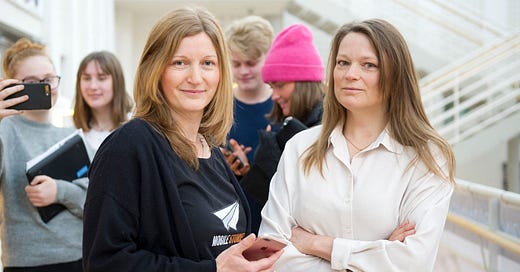📱🗞️Lotta Bergseth and Jenny Sköld of Mobile Stories on Accurate Storytelling📱🗞️
Our names are Lotta Bergseth and Jenny Sköld and we are the people who founded the company Mobile Stories. We are journalists and both have extensive experience from various newsrooms in Sweden. We want to encourage young people to create credible and elaborate material that describes their reality, dreams and ideas because our society needs their voices.
Mobile Stories offers a production and publishing tool that educates young people in media and information literacy, and improves their skills as producers in the digital media landscape.
What is the story behind Mobile Stories and how did you elevate this project at an international level? What were some of the ways you were able to overcome language barriers, different cultures?
The idea for Mobile Stories came about during our work as a reporter and photographer in the early 2010s. At the time, we noticed a growing distrust of journalists among young people. Phrases like “The media is lying” and “Nobody cares about what I think” became increasingly common in our interactions with them. At the same time, we observed the rising challenge of disinformation and conspiracy theories online.
We realized that the skills we had developed as journalists—fact-checking, storytelling, and ethical content creation—were tools everyone could benefit from when navigating the digital media landscape. This inspired us to create a scalable solution: an educational publishing tool that could be used in schools or by organizations outside of formal education.
In 2019, with support from Google.org’s program, we gained access to an international network and were invited to participate in Google-hosted Fighting Misinformation Online Summits. These events helped us forge key partnerships, like the EU-funded project ProMS which aims to scale Mobile Stories to new countries, starting with Romania, Finland, and Ireland.
Language barriers were significant challenges for us just a few years ago when discussing scaling Mobile Stories to more countries, but advancements in AI have made it much easier to adapt our tool for different regions. We use AI for initial translations, which are then refined by language consultants to ensure accuracy and cultural sensitivity. In the ProMS project we also partner with local “in-country” partners to make sure we can adjust our tools and communications to the local contexts.
What can podcasters learn from journalism to tell better, accurate stories?
Professional journalists follow a code of ethics that is quite consistent across democratic countries. This code can be incredibly valuable for podcasters who share information with their audiences. Key guidelines include things like verifying sources to ensure the information is accurate, presenting balanced perspectives and allowing all sides to be heard and respecting the integrity and privacy of individuals.
One of the most important practices is always citing your sources whenever you or your guests make a claim. This transparency builds trust and positions you as a reliable source of information for your listeners.
Why is responsibility in storytelling important, and how can podcasters embrace it?
When you publish content online, it has the potential to reach a wide audience—and with that comes the potential to cause harm. For instance, spreading unverified claims or violating someone’s privacy can have serious consequences.
Podcasters can embrace responsibility by being transparent with their sources and referencing them directly during the podcast, by fact-checking guest claims and by considering the potential harm to individuals or vulnerable groups, especially minors, before sharing sensitive information. For example, avoid naming someone suspected of a crime unless they’ve been convicted in court. Additionally, think carefully about how the people connected to your story might be affected by what you share. Using a journalist’s code of ethics—like Mobile Stories' own ethical guidelines can serve as a valuable framework for responsible storytelling. AI has introduced new ethical challenges that need careful attention. When using AI assistance in your productions, it’s important to address key ethical considerations. At Mobile Stories, we’ve also developed ethical guidelines for using AI on our platform which can also serve as a valuable resource for anyone publishing or sharing content online.
What common storytelling mistakes should podcasters watch out for and avoid?
I think a good script is a crucial foundation for any successful podcast story. It doesn’t need to be written word for word, but having a clear structure and outline allows you to stay organized while remaining flexible and creative. Another key element is having a strong hook. With so many podcasts to choose from, you need to put in the effort to capture your listeners’ attention and keep them engaged throughout the episode. Why should your listener choose your podcast over anyone else’s?
How can podcasters use Mobile Stories to keep their work in check?
Mobile Stories offers a publishing tool that lets you embed your podcast into a professional-looking article on our platform for young voices, MobileStories.com. The tool functions like a digital newsroom, where you can invite collaborators to co-create content. It also provides guidance through videos, reminders, and a digital assistant.
The platform covers everything from podcast creation tips and interview techniques to strategies for reaching a wider audience. It also emphasizes the importance of adhering to relevant laws and ethical guidelines when publishing content online. You can also access the tips video with our correspondents on our YouTube channel.
To learn more about our tool or explore our ethical guidelines and resources from professional journalists and fact-checkers worldwide, visit our homepage Mobile Stories is here to help podcasters create impactful, responsible, and engaging stories.




